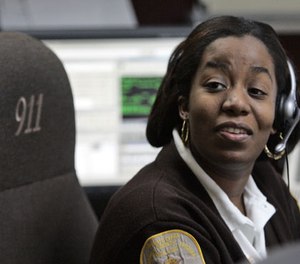
911 call takers and dispatchers are not considered first responders according to the Office of Management and Budget
People do not dial typically 911 when they win the lottery. The community dials 911 when they are in desperate need of help. Children are taught from a very young age to dial 911 when they are hurt, scared and need help. Kids are taught to trust when they dial 911 a police officer or firefighter will come to their aid with lights and sirens as quickly as they can. Adults dial 911 under a multitude of circumstances assuming there is going to be a voice on the line who will render help when it is needed the most.
A dispatcher or call taker picks up the line and expects they will speak to a caller potentially at their worst. The dispatcher is ready to help a caller administer CPR, listen to hysterical screaming, calm a crying child, reason with a suicidal subject or deliver a baby.
There is no clerical or administrative position in the public safety industry that must endure this level of stress while remaining calm and meticulously administering their duties. However, under the U.S. Office of Management and Budget, dispatchers are classified as just that: “clerical.”
Dispatchers are first responders, not ‘clerical’ help
Police, fire and EMS dispatchers are vital components on the spectrum of emergency response personnel. Dispatchers are essentially the very first contact in an emergent situation. They must triage the call, gather pertinent information and render the necessary aid.
The work performed by a dispatcher goes beyond merely relaying information. Dispatchers are usually speaking to people under great distress, injury and fear. The dispatcher must call upon their experience and training to decipher what needs to be done to render aid to the caller within seconds of picking up the line.
The current classification of 911 professionals under Standard Occupational Classification is reflected as police, fire and ambulance dispatchers under a category of Office and Administrative Support Occupations. With this inaccurate definition in mind, the Association of Public-Safety Communications Officials (APCO) has taken on the task of recommending to the Office of Management and Budget (OMB) the reclassification of the Public Safety Telecommunicator into the protective service, the same classification as police officers and firefighters.
The first reclassification request by APCO was rejected by the OMB seemingly due to a lack of complete understanding as to what the duties of a dispatcher include. APCO appealed the decision and held an educational webinar on the reclassification of Public Safety Telecommunicators as part of Protective Occupations. The webinar included an invitation to participants to speak out to federal officials and express their dismay with the current classification of 911 dispatchers as an Office and Administrative Support occupation.
By definition
The definition of a first responder, according to Merriam-Webster, is “among those responsible for responding immediately to the scene of an accident or emergency to provide assistance.” This assistance is specifically what an emergency dispatcher is trained to do, although not physically at the scene.
Along with the training and administration of first responder duties comes vicarious PTSD. Studies have demonstrated that first responder personnel do not need to be physically on scene to develop this disorder. Dispatchers answer multiple traumatic calls and handle stressful radio incidents without decompression time to process the associated feelings and somatic responses. This traumatic exposure alone sets the job of a public safety dispatcher apart from any clerical or administrative occupation.
Classification into the appropriate occupational category is merely a paperwork change within the OMB. During a conversation with Chela Cottrell, a dispatcher with Citrus Heights Police Department in California, the biggest benefit from this reclassification could potentially be reflected in the ability to clearly define the job standards of a Public Safety Telecommunicator among agencies across the board.
A big concern to most communication center administrators and dispatch personnel is the upcoming conversion to NextGen911 which will include 911 caller text and video streaming communication abilities. Standardized training and potential federal grant funds for upgrade is only available with the new classification as safety personnel.
“Dispatchers are not asking to be treated as a police officer or firefighter,” Cottrell said, “We are simply asking to be recognized for what our profession is truly about.”
For further information or to share comments in support of Public Safety Telecommunication reclassification go to APCO's Take Action Page.
Copyright © 2024 PoliceGrantsHelp.com. All rights reserved.
